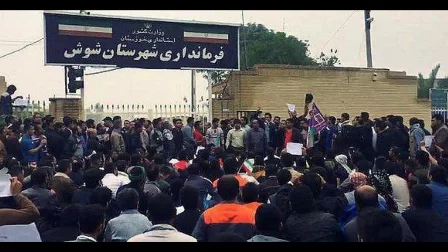Editorial: Iran: Unpaid wages, hungry workers, live bullets

Mass protests in cities across Iran erupted on November 15 in response to a hike in the price of fuel. The government responded with lethal force and shut down the internet, and in some places even mobile phone service, cutting people off from one another and from the outside world. Since then, some limited information has begun to trickle out.
Video evidence analyzed by Amnesty International confirms that security forces, including rooftop snipers, opened fire on unarmed demonstrators. Hundreds of protestors, largely workers and the urban poor, are so far known to have been killed; many thousands have been arrested. Families are being billed the price of the bullets which killed the victims.
In the city of Shush, home to the giant Haft Tapeh sugar plantation and refining complex, workers had been holding regular protests since early October – before the uprising broke out – demanding wages which were last paid in September. Shortly after the November 15 protests began, Haft Tapeh locked its gates, and they have yet to reopen. As so many times in the past, Haft Tapeh workers are hungry; even the bakeries now deny them credit.

Haft Tapeh workers demand their unpaid wages in front of the government office in Shush
For years, the Haft Tepah workers have been compelled to hold strikes and demonstrations in response to massive wage arrears and the company’s failure to make its mandatory social security payments. In February 2018, following months of strikes and protests , Haft Tapeh workers finally received wages unpaid since July 2017. Now the cycle of hunger and corruption has begun again.
In 2008, the Haft Tapeh workers established an independent union in the course of a 42-day strike over unpaid wages. The company (now privately owned) and the regime refuse to recognize the union, whose members and leaders have paid for their engagement with prison terms, dismissal and blacklisting.
While the government insists that the protests were the work of foreign plotters, the Haft Tapeh workers’ years of struggle for bread, for dignity and for their rights illuminate the brutal conditions which brought the people on to the streets across the country. The government must be held to account for its crimes, and now, more than ever, international solidarity is needed in support of workers and labour rights defenders in Iran.
UPDATE: Shortly after this article was published Haft Tapeh reopened and workers began returning to work. They still have not received their wages; the people of Iran continue to count and to mourn their dead.